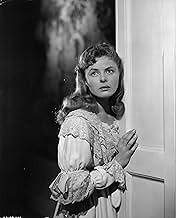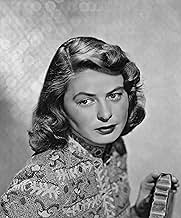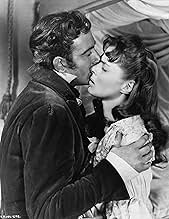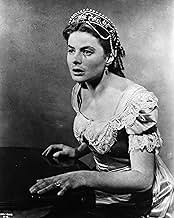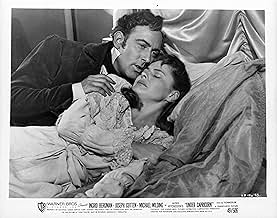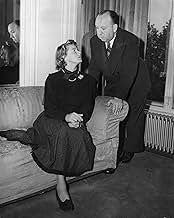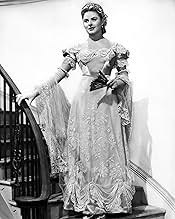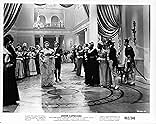A young gentleman goes to Australia where he reunites with his now married childhood sweetheart, only to find out she has become an alcoholic and harbors dark secrets.A young gentleman goes to Australia where he reunites with his now married childhood sweetheart, only to find out she has become an alcoholic and harbors dark secrets.A young gentleman goes to Australia where he reunites with his now married childhood sweetheart, only to find out she has become an alcoholic and harbors dark secrets.
- Awards
- 3 wins total
- Major Wilkins
- (as Francis de Wolff)
Featured reviews
A Melodramatic Romance by Alfred Hitchcock
Charles learns that Sam is not accepted by the local society but he goes to the dinner party, where he meets Sam's wife Henrietta Flusky (Ingrid Bergman), an old acquaintance of his childhood in Ireland. Soon Charles discovers that Henrietta is alcoholic and a totally unstable woman controlled by the housekeeper Milly (Margaret Leighton), and Sam was the stable boy of her family in Ireland. They had fallen in love with each other and Henrietta elopes with Sam. However, her brother hunts them and Sam kills him and is deported to Australia. Charles stays in Sam's farm to help Henrietta and soon he falls in love with her. Meanwhile Sam is manipulated by Milly and his jealousy gets him into trouble and discloses dark secrets from his past with Henrietta.
"Under Capricorn" is a melodramatic romance by Alfred Hitchcock set in Australia in 1831, in the period of colonization of this great nation by convicts from the United Kingdom. The genre is unusual in the career of the master of suspense, but supported by magnificent cinematography and cast, highlighting Ingrid Bergman, Joseph Cotton, Michael Wilding and Margaret Leighton in a small but very important role. This film is not among my favorite Hitchcock's films and could be shorter. However, it is worthwhile watching it to see some aspects to the colonization of Australia. My vote is six.
Title (Brazil): "Sob o Signo de Capricórnio" ("Under the Capricorn Sign")
Note: On 30 October 2024, I saw this film again.
Underrated and beautifully photographed
Watch it and try not to compare...
Joseph Cotton was appealing, even though his character throughout much of the movie seemed to be villainous, and his reasons for being that way were quite apparent by the end of the film. My suspension of disbelief centered around Bergman's casting as an Irish aristocrat: once in awhile she managed to say a word that had an Irish flavor, but mostly she just sounded Swedish. However, that did not detract at all from her usual thoughtful performance. Michael Wilding irritated me a little with his foppish ways, yet even he managed to come off as a human being with faults and virtues...just like the rest of us. Leighton was superb and she, like Cotton, seemed to be a treacherous yet sympathetic character. I think it was the portrayals of complicated people with no one being painted as totally good or bad, the nuanced characterizations that I found so artistic yet real.
If you approach this movie without preconceptions, you might be drawn into it and appreciate Hitchcock's genius in an entirely different way.
An acceptable melodrama but sadly not much more
I leave the debate over whether this is Hitchcock's worst film to those that debate such things and try to list everything comparing apples and potatoes seemingly for the sake of it. As surprising as it may be, I'm not one of those but I can understand why this film has been labelled such by others because it is surprisingly run-of-the-mill for that great director. The story is soapy etc on the surface but it had great dark potential with so many threads and emotions floating around. It is surprising then that none of them are made more of and the film just sticks with the genre by becoming nothing more than an acceptable period melodrama. There is still just about enough about it to make you remember that this was from Hitchcock but I was disappointed by how straight-down-the-line it actually was in the end. The direction is still good though, with nice camera movements and shots, and the sets are colourful enough to fit the genre (if not the spirit of birthing Australia).
The cast try hard but nobody can lift the material all by themselves. To his credit, Cotton tries hard with a brooding and dark performance but he can't do it alone. Bergman is good and could have done wonders with a much more complex character, in the end what she has to deliver is nothing special and just melodrama. I didn't care for Wilding; his performance wasn't up to much and I dn't think he eld his own that well alongside Cotton and Bergman. Support from Parker and Leighton is solid but they aren't given that much to do.
Overall then this is a serviceable enough melodrama but it is easy to see why fans of Hitchcock would be forgiven for expecting more to have been made of it. The cast is good and the potential is there in the story but, aside from a steady hand and a few interesting touches, this is really just a genre melodrama that could have been more than it was.
An Odd Misfire From A Great Director
There's little fault to be found with the settings, which are convincing enough. Some of the characters never really come to life, but there is still an interesting mix of them. The pace is one area that definitely could have been improved, and the pre-occupation with the long takes certainly doesn't help at all. The technique worked very well in Hitchcock's "Rope", because it meshed with the setting and the subject matter. It doesn't fit so well here in "Under Capricorn", and it often dilutes the suspense rather than increasing it.
By no means is it a total clinker - the story does have some interesting parts, and with a different approach it could have been suspenseful, even memorable. Hitchcock's technical skill is still present in many respects, and even Hitchcock's lesser achievements are still worth seeing.
The movie's overly-polished feel is consistent with the approach that was chosen. It's at least one case where the more familiar, less affected Hitchcock style would have resulted in a much better film.
Did you know
- TriviaIn 1958, Cahiers du Cinema (French Film Magazine) voted this movie as one of the ten greatest movies of all time.
- GoofsAs the characters gather for the dinner party, fairly early on in the film, the camera tracks backwards across the dining room. The table has been pushed into the path of the camera by the time it comes into view, but the candlesticks are still shaking severely from the jerking appearance of the table (their shaking lessens as the take continues).
- Quotes
[last lines]
Winter: We'll be sorry to lose you, sir.
Hon. Charles Adare: If I may say so, Winter, I'm sorry to go. Not a bad place. It is said that there is some future for it, there must be- it's a big country.
Winter: Then why are you leaving, sir?
Hon. Charles Adare: That's just it, Winter. It's not quite big enough. Bye, good luck.
- Crazy creditsOpening credits roll up over a map of Australia.
- Alternate versionsThere is an Italian edition of this film on DVD, distributed by DNA Srl: "SOTTO IL CAPRICORNO (Il peccato di Lady Considine, 1949) New Widescreen Edition + FRAGILE VIRTÙ (1927)" (2 Films on a single DVD, with "Under Capricorn" in double version 1.33:1 and 1.78:1), re-edited with the contribution of film historian Riccardo Cusin. This version is also available for streaming on some platforms.
- ConnectionsEdited into Histoire(s) du cinéma: Fatale beauté (1994)
Details
- Runtime
- 1h 57m(117 min)
- Color
- Aspect ratio
- 1.37 : 1

